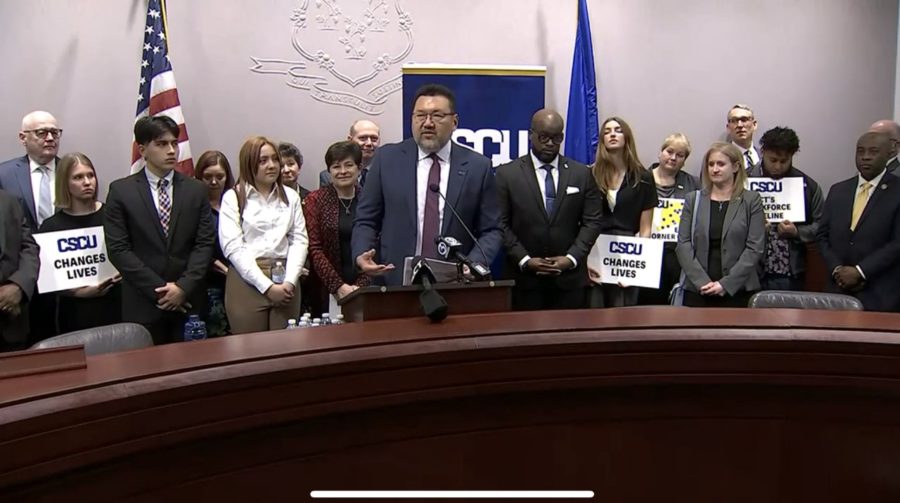CSCU President: “The Proposed Budget Would Be Devastating for CSCU”
May 4, 2023
Students and leaders of Connecticut State Colleges and Universities said Monday that the major cuts proposed by the state legislature would be “devastating” to CSCU if approved.
“We will be forced to lay off 650 full-time faculty and staff,” CSCU President Terrence Cheng said in a news conference at the Legislative Office Building. “We will need to eliminate nearly 3,000 part-time positions.”
CSCU requested $650 million for the budget, however, both Gov. Ned Lamont and the appropriations committee budgets fell short of what they said was needed. Both budget plans are decreasing for all 17 state colleges and are calling for over $335 million in cuts over a span of two years.
If approved, colleges like Central Connecticut State University will be prompted to cut major programs on campus, including mental health services and academic advising, in addition to laying off hundreds of faculty employees.
“Shutting down high-cost programs will be unavoidable,” Cheng said. “But those high-cost programs; the manufacturing and healthcare, they’re the ones producing the critical talent that Connecticut needs.”
The college system has $150 million as one-time funding in the current year, but the federal COVID-19 relief money is expiring in various groups across the state. Legislative leaders are expected to follow the state-mandated spending cap, which restricts the amount Lamont and the legislature can spend.
The cost of tuition is also projected to increase if the budget is passed, which causes concern for students’ success in the CSCU system, Cheng said.
“We do everything we can to try and keep tuition down, but we would be forced to increase tuition,” Cheng said. “Students will get far less, and they will pay much more.”
CCSU president Zulma Toro said that many of their students are from Connecticut, and are working multiple jobs to pay for their current tuition.
“Many of them are working several jobs to put themselves through school,” Toro said. “Many of them are first-generation students and they are investing in themselves. I am asking the state to invest in them as well.”
Without state funding, Central will not be able to deliver and facilitate the social mobility of the working class and educate future Connecticut leaders, Toro said.
The majority of students in the CSCU system are minorities, accounting for 52% of all students, Cheng said. Without adequate state funding, supporting students who do not come from the “power zip codes” will be at risk.
Anasofia Rodriguez, first-generation CCSU freshman, moved to the U.S. seven years ago from Puerto Rico knowing no English. She said the reason why she chose Central was because of the education program offered here, in addition to the special services that are offered to help first-generation students stay on track.
Rodriguez also spoke at the news conference Monday and said that higher tuition will negatively affect students like her who have to fund college for themselves.
“It’s very important for us students to have such a low tuition,” Rodriguez said. “For me, I have to work two jobs to be able to pay for my school because my mom cannot help me.”
Those who are seeking to divest from public higher education said enrollment rates are declining, Cheng said this is not true.
“Our enrollment is stabilizing,” Cheng said. “After a sharp COVID decline, we have seen positive growth trends, and as we evolve we anticipate greater demand.”
To bring enrollment rates up, Cheng said CSCU has plans to create and launch new programs with better attention. However, he said this cannot be done without proper state support.
President Toro also said that total enrollment at Central has remained constant and the size of the fall 2022 full-time, first-time and transfer classes showed an upward trend. The university has also been financially prudent, Toro said.
“Budget management strategies used at CCSU have contributed to a permanent reduction in our budget of $13.1 million,” Toro said.
Over the coming months, CSCU is preparing a full-court advocacy press that is starting on April 27 at the state capitol, Cheng wrote in an email to the CSCU community. Students, faculty and others will be able to speak to legislators about the importance of the CSCU system and the harmful repercussions of the proposed budget.
Budget negotiations between Lamont and top legislative leaders are underway, with just six weeks until the legislature adjourns on June 7. Prior to this, they plan on a two-year, $50.5 billion state budget.
“We understand and respect the need for fiscal restraint,” Cheng said. “But it should never come at the expense of our most vulnerable students.”







